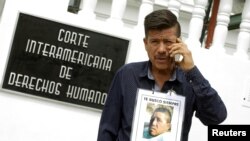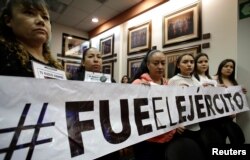The Inter-American Court of Human Rights on Thursday began hearing the first case of alleged state-led human rights violations in Mexico to be brought since the country militarized its battle against violent drug cartels over a decade ago.
The case of Alvarado Espinoza et al vs. Mexico will be held in San Jose, in Costa Rica, on Thursday and Friday. It is expected to shine a harsh light on Mexico's military assault on warring drug gangs, which the government has recently sought to enshrine in law, despite criticism from rights groups.
In December 2009, three years after former President Felipe Calderon sent in the army to curb drug violence, a group of soldiers stormed two houses belonging to three members of the Alvarado family in the northern border state of Chihuahua, the family and rights groups say.
After being bundled into the soldiers' vehicles, Nitza Paola Alvarado, Jose Angel Alvarado and Rocio Irene Alvarado were never seen again.
"The last words I remember my mother saying were 'I'll be right back,'" Nitza's daughter, Paola, told Reuters. "But she never returned. We're still looking for her."
Jaime Alvarado, a relative of one of the people who disappeared, said he hoped the court would take his family's experiences into account.
"I would ask the court, please, that they each put themselves in our shoes ... and what we have lived," said Alvarado, who said he had to flee from his home town due to death threats.
During at least 10 investigations into the incident, troops from the Mexican army's 35th battalion were implicated, according to Mexican advocacy group the Center for Women's Human Rights (CEDEHM), which is representing the family of the missing Alvarados. None of the probes resulted in a conviction.
The CEDEHM alleges that the Mexican government's failures in the case raise hard questions about its drug war.
The Defense Ministry, which oversees the military and the air force, said it did not have information about the case.
The Washington Office on Latin America found that between 2012 and 2016, the Mexican attorney general opened 505 cases in which members of the military were accused of violating the human rights of civilians.
Mexico's Supreme Court is examining the legality of a contentious new security law, which has sparked fierce criticism by opponents who fear it could open the door to more abuses.
The government says the law sets out rules under which the armed forces can operate in the battle with organized crime, but backlash against the legislation led President Enrique Pena Nieto to send it to the court in December for review.
Mexico suffered at least 200,000 homicides between 2007 and 2017, according to official figures, and last year posted the highest murder tally since modern government records began.
The Inter-American Court hears cases of human rights abuses in Latin America and can order governments to investigate crimes and compensate victims.









